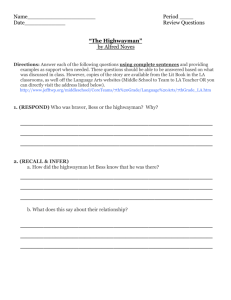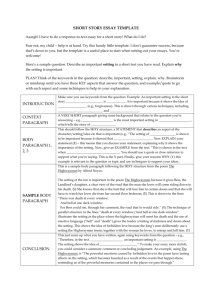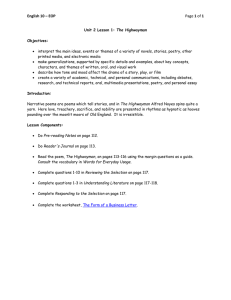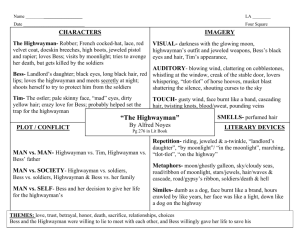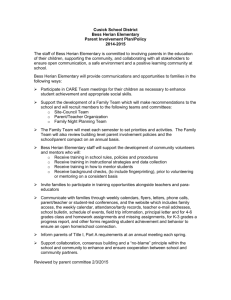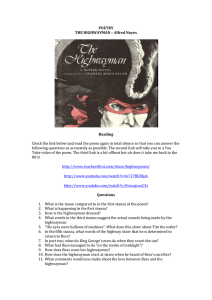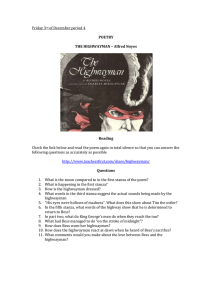The Highwayman poem theme
advertisement
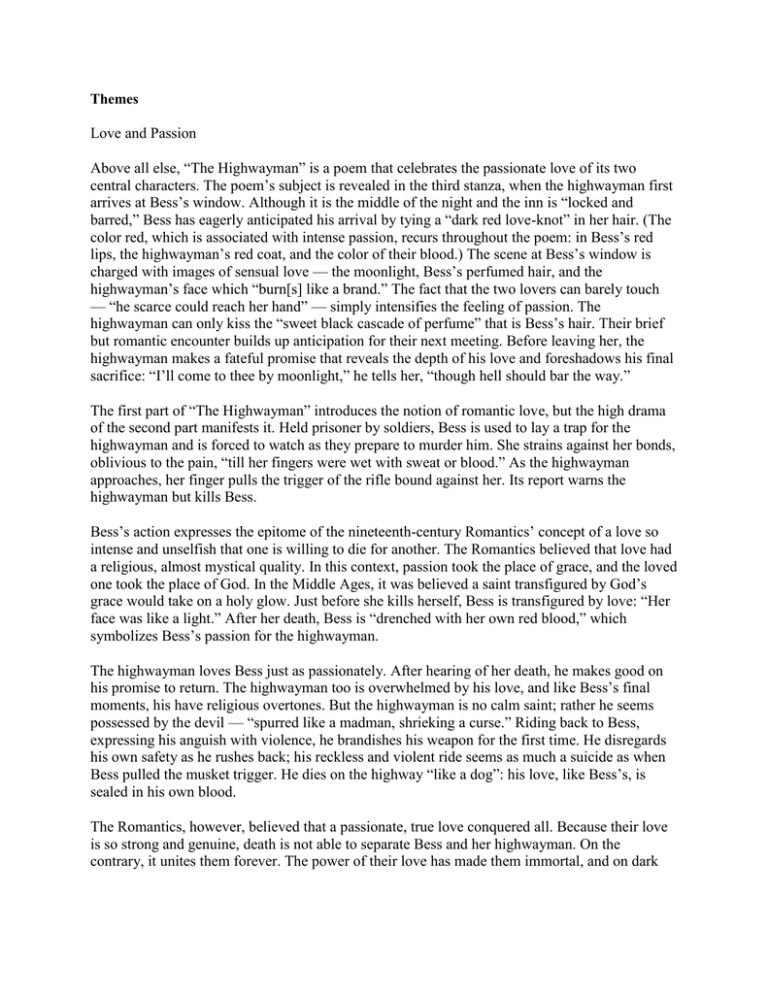
Themes Love and Passion Above all else, “The Highwayman” is a poem that celebrates the passionate love of its two central characters. The poem’s subject is revealed in the third stanza, when the highwayman first arrives at Bess’s window. Although it is the middle of the night and the inn is “locked and barred,” Bess has eagerly anticipated his arrival by tying a “dark red love-knot” in her hair. (The color red, which is associated with intense passion, recurs throughout the poem: in Bess’s red lips, the highwayman’s red coat, and the color of their blood.) The scene at Bess’s window is charged with images of sensual love — the moonlight, Bess’s perfumed hair, and the highwayman’s face which “burn[s] like a brand.” The fact that the two lovers can barely touch — “he scarce could reach her hand” — simply intensifies the feeling of passion. The highwayman can only kiss the “sweet black cascade of perfume” that is Bess’s hair. Their brief but romantic encounter builds up anticipation for their next meeting. Before leaving her, the highwayman makes a fateful promise that reveals the depth of his love and foreshadows his final sacrifice: “I’ll come to thee by moonlight,” he tells her, “though hell should bar the way.” The first part of “The Highwayman” introduces the notion of romantic love, but the high drama of the second part manifests it. Held prisoner by soldiers, Bess is used to lay a trap for the highwayman and is forced to watch as they prepare to murder him. She strains against her bonds, oblivious to the pain, “till her fingers were wet with sweat or blood.” As the highwayman approaches, her finger pulls the trigger of the rifle bound against her. Its report warns the highwayman but kills Bess. Bess’s action expresses the epitome of the nineteenth-century Romantics’ concept of a love so intense and unselfish that one is willing to die for another. The Romantics believed that love had a religious, almost mystical quality. In this context, passion took the place of grace, and the loved one took the place of God. In the Middle Ages, it was believed a saint transfigured by God’s grace would take on a holy glow. Just before she kills herself, Bess is transfigured by love: “Her face was like a light.” After her death, Bess is “drenched with her own red blood,” which symbolizes Bess’s passion for the highwayman. The highwayman loves Bess just as passionately. After hearing of her death, he makes good on his promise to return. The highwayman too is overwhelmed by his love, and like Bess’s final moments, his have religious overtones. But the highwayman is no calm saint; rather he seems possessed by the devil — “spurred like a madman, shrieking a curse.” Riding back to Bess, expressing his anguish with violence, he brandishes his weapon for the first time. He disregards his own safety as he rushes back; his reckless and violent ride seems as much a suicide as when Bess pulled the musket trigger. He dies on the highway “like a dog”: his love, like Bess’s, is sealed in his own blood. The Romantics, however, believed that a passionate, true love conquered all. Because their love is so strong and genuine, death is not able to separate Bess and her highwayman. On the contrary, it unites them forever. The power of their love has made them immortal, and on dark and stormy nights their love is renewed at the inn. As the poem ends, Bess is eternally plaiting a love-knot in her hair for the highwayman. The Outlaw The outlaw held an important place in the Romantic imagination. The Romantics maintained that the rules and norms of bourgeois society — such as money lust and the denial of feelings — made it impossible to experience life to the fullest. Far from being a criminal, the outlaw had the courage to flaunt society’s rules. As a result, he won deeper insight into the world and himself, and he had more genuine emotional experience than ordinary people. In general, the outlaw lived a more worthwhile life. Both the highwayman and Bess are outlaws in this tradition. The highwayman is literally an outlaw who prowls the roads robbing travelers. But the poem hints that his actions are more adventure than crime. The gold he will bring Bess is not booty, it is his “prize,” or his reward for meeting a challenge successfully. In the first stanza of the poem he is associated with the moon, which is depicted as a “galleon,” or the vessel in which pirates travel. He dresses like an outsider as well, wearing, for instance, “a French cocked-hat” rather than an English one. Bess and the highwayman are outsiders in other ways as well. They meet in the dead of night when, according to tradition, normal daytime rules are suspended. Their love is a secret one, hidden from daytime view. At least, they think it is; but in fact, Tim the ostler knows about them. Tim views the highwayman and Bess with the prejudice, suspicion, and disapproval of the middle-class world. With jealousy, as well, for he lusts after Bess, but is too cowardly to approach her. The unhealthiness of Tim’s feelings is reflected in his physical appearance, which is in stark contrast to the gallant and debonair impression the highwayman makes. Tim is pale, sickly, degenerate, and “his eyes were hollows of madness.” What’s more, he is “dumb as a dog.” He cannot comprehend the life or emotions of Bess and the highwayman although he is directly confronted with them. The highwayman is associated with the night, but also with goodness and purity of feeling. His weapons are not threatening, they merely “twinkle” at his sides. He does not use them — at least not until after Bess’s death. The highwayman’s essential goodness is thrown into sharp relief by the sadistic soldiers who barge into the inn, drink without paying, and take Bess hostage. The highwayman is content merely to breath the perfume from Bess’s hair because he loves her. In contrast, the soldiers mistreat her; they bind her to her bed with a musket tied beneath her bosom. After they bind and gag her, they commit a symbolic rape by forcing their kisses upon her. Most horribly, she is forced to watch as they prepare to murder her lover. The soldiers are supposed to enforce and uphold the law. Their immoral behavior shows just how meaningless their daytime laws really are. Noyes implies that it is no crime to oppose these men, but rather, it is honorable to live outside the law in such a world.
